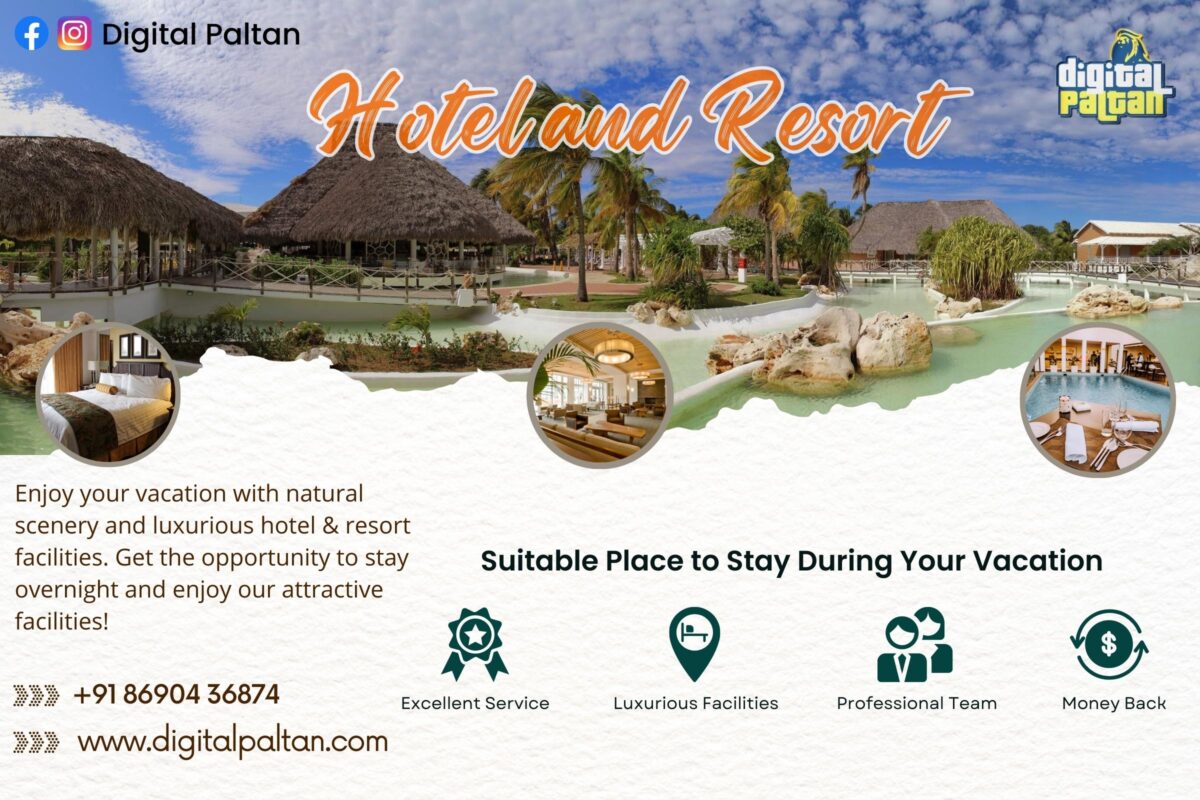Hotels and resorts need to use digital marketing techniques to stand out from the competition, draw visitors, and improve their online visibility in the hospitality sector, which is becoming more and more competitive. In order to reach their target market, encourage reservations, and foster customer loyalty, hotels and resorts may use a variety of effective tools and strategies available through digital marketing. In this article, we examine powerful digital marketing techniques that have been especially designed for the hotel and resort sector to help businesses succeed in the current digital environment.
Making a user-friendly website
The online marketplace for hotels and resorts is a beautifully designed, user-friendly website. In order to provide potential visitors with an immersive experience, it should highlight the property’s distinctive features, facilities, and eye-catching images. In order to ensure a fluid surfing experience across all platforms, the website should be optimised for both desktop and mobile devices. It should also have easy-to-use navigation so that users can access information and book bookings without difficulty.
Visibility through Search Engine Optimisation (SEO)
To improve their online presence and bring organic traffic to their websites, hotels and resorts must invest in search engine optimisation (SEO). Businesses may enhance their search engine rankings by carrying out keyword research and applying SEO best practises. This entails creating high-quality backlinks as well as optimising the content, meta tags, and descriptions of websites. When tourists are looking for lodging alternatives in a certain area, a strong SEO approach aids in helping them locate the hotel or resort.
Interesting Content Marketing
The establishment of hotels and resorts as popular travel destinations depends heavily on content marketing. Businesses may interact with potential customers, display their expertise, and encourage travel by producing and disseminating high-quality material like blog entries, location guides, and travel advice. In order to draw in visitors looking for ideas and useful information about the place, the content should be educational, entertaining, and shared.
Making Use of Social Media Platforms
Hotels and resorts may connect with their target audience, increase brand recognition, and interact with visitors using social media channels. Businesses may offer gorgeous images, behind-the-scenes tales, customer reviews, and exclusive promos by establishing a presence on social media sites like Facebook, Instagram, Twitter, and LinkedIn. A devoted community of visitors and brand supporters may be developed by actively engaging with followers, answering questions, and posting regular updates.
OTAs (online travel agents) and direct booking techniques
To increase their clientele and income, hotels and resorts can make use of direct booking techniques as well as online travel agencies (OTAs). Working together with well-known OTAs enables properties to access their huge client base and get visibility to a wider audience. The use of direct booking tactics, such as providing special benefits, discounts, or loyalty programmes through the hotel’s own website, simultaneously encourages customers to book directly, avoiding third-party commissions and enhancing the hotel’s brand.
Affiliate marketing and influencers
In the hotel and resort sector, influencer and affiliate marketing have become quite popular. By collaborating with influencers and travel bloggers, you can spread the word, attract new audiences, and increase reservations. Influencers may provide captivating material that highlights the property, share their own stories, and make suggestions. In order to encourage affiliates to advertise the hotel or resort on their networks and increase traffic and reservations, affiliate marketing programmes may also be put into place.
The Management of Online Reputation
For hotels and resorts, maintaining a favourable web reputation is crucial. When choosing a hotel, prospective visitors frequently look at reviews and ratings. Monitoring and reacting to customer evaluations on websites like TripAdvisor, Google evaluations, and social media are active components of implementing an online reputation management plan. Hotels and resorts may increase reservations, establish customer trust, and improve their image by responding to comments, fixing problems, and highlighting exceptional guest experiences.
Personalization and email marketing
Hotels and resorts may use email marketing as a potent tool to interact with visitors, foster client connections, and encourage return business. Businesses may provide personalised information, limited-time deals, and specialised suggestions by collecting visitor email addresses throughout the booking process or through website subscriptions. This promotes direct reservations, keeps the hotel top-of-mind, and builds customer loyalty.
Accepting New Technologies
Emerging technologies may be used by hotels and resorts to improve customer service and optimise operations. When chatbots or AI-powered virtual assistants are used, for instance, guests may receive prompt replies to their questions, enhancing both customer service and engagement. In line with changing guest preferences, using contactless technology, such as smartphone check-ins, digital key access, and automated guest services, improves convenience and safety.
Conclusion
Success in the hotel and resort sector now depends heavily on digital marketing. Hotels and resorts can improve their marketing efforts, draw in more visitors, and cultivate long-lasting customer relationships by developing a user-friendly website, putting effective SEO strategies into practise, producing compelling content, utilising social media platforms, leveraging OTAs and direct booking strategies, investigating influencer and affiliate marketing, placing a high priority on online reputation management, utilising email marketing and personalization, and embracing e-commerce. Accept the power of digital marketing and establish your hotel as the best option in the cutthroat hospitality sector.



